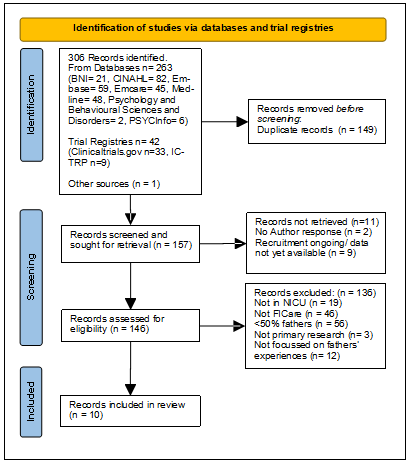Neonatology
Session: Neonatal General 1: NICU Care
52 - A Systematic Review to Explore Fathers’ Experiences of Family Integrated Care in the Neonatal Unit.
Friday, May 3, 2024
5:15 PM - 7:15 PM ET
Poster Number: 52
Publication Number: 52.304
Publication Number: 52.304

Rupa Rubinstein, MBBCh MRCPCH MSc (she/her/hers)
Neonatal Clinical Research Fellow
Homerton Healthcare NHS Foundation Trust, QMUL
LONDON, England, United Kingdom
Presenting Author(s)
Background: Family-integrated care (FICare) has gained prominence in the global neonatal community over the last decade. It is a culture where families are considered to be key partners & collaborators in the care of their newborn in the neonatal unit (NU). However, research primarily focuses on maternal & infant outcomes, fathers are rarely seen.
Objective: This systematic review aimed to explore primary research that reported on fathers’ experiences of FICare in the NU.
Design/Methods: The systematic review protocol was registered on the PROSPERO database (CRD420223067602). Eligibility criteria included primary research published after 2000 with at least half of the study participants to be fathers to ensure father-specific results. The database & clinical trials registry searches were conducted in October 2022. 2 researchers screened the records at abstract & full text level with disagreements resolved through discussion & third researcher mediation. Data extraction was conducted using the Matrix Method.
Results: 306 records were identified , & 10 were included in the systematic review (Figure 1). The 3 qualitative studies used semi-structured post-discharge interviews. The 7 quantitative studies used a total of 13 different questionnaires.
448 fathers & 479 infants from 25 NUs were included. Where reported, the majority identified with the local culture/language (93.6%), were married/cohabiting with the mother (98.1%) & were employed (86.0%). The babies primarily required high-dependency or special care at recruitment & were moderate to late preterms. FICare helped fathers assume their fatherly role, and reduced stress related to ‘Relationship & Parental Role (p < 0.001). FICare fathers better understood the unrelenting work of breastmilk feeding & found it easier to work with neonatal staff in caring for their baby. Educational programmes significantly improved paternal ‘Knowledge of Preterm Infant Behaviour’ (p < 0.001).
Paternal satisfaction, self-efficacy/sense of competence & bonding appeared to be unchanged by FICare programmes.
Conclusion(s): FICare helps fathers to be more present for their HDU/SCBU babies & develop a more satisfactory relationship & communication with neonatal staff. FICare reduces paternal stress, particularly in relation to their parental role, understanding their infants’ appearance & behaviour. However, further research is needed to explore the experiences of fathers of extremely premature babies, babies receiving intensive care & fathers from diverse backgrounds.

